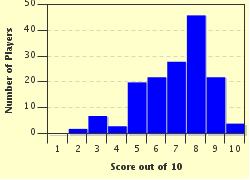Quiz Answer Key and Fun Facts
1. John was excited when he won November's perfect attendance reward and attributed his success to how responsible he was. The next month Madison won the award, and John attributed her success to a rigged system. What psychological theory could explain John's behavior?
2. A woman was robbed on a busy street while people stood around and did not offer their help. Which phenomenon occurs when people are less likely to offer help when they are in a large group?
3. The highly controversial Milgram experiment of 1963 tested which form of compliance?
4. A baby cried when something was out of sight because he did not realize that it still existed somewhere else. What concept did this baby not understand?
5. Which of these occurs when you like those who show that they like you?
6. Jim observed his older brother cleaning his room and modeled this behavior by cleaning his own room. What type of learning does Jim display?
7. Molly was misbehaving in school. Her father chose not to punish her, and instead he tried to change Molly's behavior by rewarding her with ice cream when she was good. What type of learning is this?
8. Randy knocked on your door and asked you if you could donate $1,000 to his charity. You could not afford this, but you agreed to pay Randy's second smaller request of $100. What marketing strategy did Randy use?
9. Jim went through a traumatic experience, and then he tried to bury memories of the event to try to forget them. Which defense mechanism was Jim using?
10. Someone had a car accident and lost memories from events that occurred before the accident. Which type of amnesia did this person experience?
Source: Author
Computer100
This quiz was reviewed by FunTrivia editor
rossian before going online.
Any errors found in FunTrivia content are routinely corrected through our feedback system.

